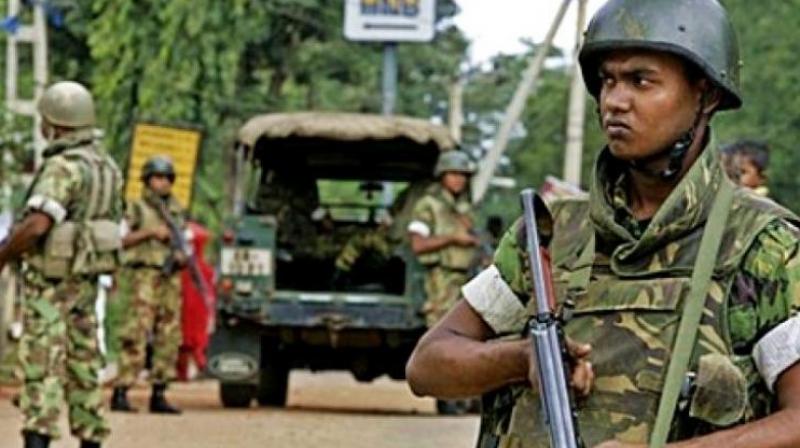Sri Lanka deploys thousands of troops to look for suspects in Easter bomb attacks
The president has asked the police chief and top defence ministry bureaucrat to step down, though neither has done so yet.

Colombo: Sri Lanka deployed thousands of troops overnight to help police search for suspects in Easter suicide bomb attacks claimed by the Islamic State group that killed nearly 360 people.
The government has acknowledged “major” lapses over its failure to prevent the horrific attacks despite receiving specific intelligence warnings.
Recriminations have flown since suicide bombers blew themselves up in luxury hotels and churches packed with Easter worshippers on Sunday.
The president has asked the police chief and top defence ministry bureaucrat to step down, though neither has done so yet.
Overnight, security forces using newly granted powers under the country’s state of emergency arrested 16 more suspects in connection with the attacks.
Police have so far arrested 75 people but tensions remain high with several suspects unaccounted for.
Brigadier Sumith Atapattu said the army had increased its deployment by 1,300 to 6,300 overnight, with the navy and airforce also deploying 2,000 more personnel.
Authorities also announced a ban on drone flights and suspended licences issued to commercial operators with immediate effect.
‘Major’ lapse
The government has been on the defensive over revelations that specific warnings about an attack went ignored.
Sri Lanka’s police chief warned on April 11 that suicide bombings against “prominent churches” by the local Islamist group National Thowheeth Jama’ath (NTJ) were possible, citing information from a foreign intelligence agency.
CNN reported that Indian intelligence services had passed on “unusually specific” information in the weeks before the attacks, some of it from an IS suspect in their custody.
But that information was not shared with the prime minister or other top ministers, the government has said.
“It was a major lapse in the sharing of information,” deputy defence minister Ruwan Wijewardene conceded at a press conference on Wednesday.
President Maithripala Sirisena, who is also defence and law and order minister, pledged Tuesday to make “major changes in the leadership of the security forces in the next 24 hours”.
On Thursday, he will meet with the country’s political parties to discuss the crisis, and later with religious leaders as concerns rise about a potential backlash against Sri Lanka’s Muslim minority.
Investigators are still piecing information together about the attack and those involved, with Wijewardene revealing Wednesday that one attacker had studied in Britain and did post-graduate studies in Australia before returning to Sri Lanka.
“Most of them are well-educated and come from middle, upper-middle class families, so they are financially quite independent and their families are quite stable financially, that is a worrying factor in this,” the minister added.
Key suspect
An FBI team is now in Sri Lanka, Wijewardene said, and Britain, Australia and the United Arab Emirates have all offered intelligence help.
Experts say the bombings bear many of the hallmarks of IS attacks, and the government has suggested local militants could not have acted alone.
But it has not yet officially confirmed any IS role in the blasts.
A key suspect in the attacks also remains unaccounted for: NTJ leader Zahran Hashim.
He appears to be among eight people seen in a video released Tuesday by IS after it claimed the attacks, seen leading a pledge of allegiance to IS chief Abu Bakr al-Baghdadi.
Officials said it was still unclear whether Hashim was among the suicide attackers or had escaped after the blasts.
Officials have said they cannot rule out further attacks while suspects remain at large.
In all, nine people are believed to have blown themselves up on Sunday, either during attacks or when police attempted to arrest them.
Sri Lankan police sources have told AFP that two Muslim brothers, sons of a wealthy Colombo spice trader, blew themselves up at the Shangri-La and the Cinnamon Grand hotels.
Their father is now in custody.
The Kingsbury hotel in the capital was the last one hit. A fourth planned attack on a hotel failed, authorities said. The would-be attacker was followed back to a Colombo lodge, where he blew himself up, killing two people.
Sources close to the investigation said two more people -- a man and a woman -- blew themselves up at another location as security forces launched a raid. Those blasts killed three police.
Dozens of foreigners were among the victims in the blasts, including three children of a Danish billionaire, eight Britons, 10 Indians and four Americans.
The United Nations said at least 45 children, Sri Lankans and foreigners, were among the dead.

